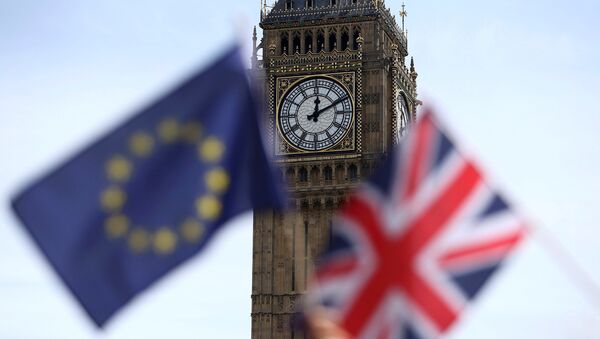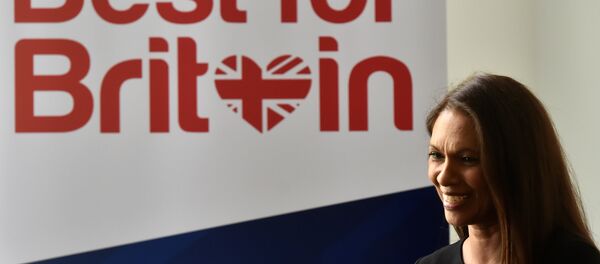In the immediate wake of the June 23 referendum result in 2016, it appeared the UK was very much a nation divided. On top of an almost evenly split result (52 percent to 48 percent), the rhetoric issued by both sides — one ascendant, one dejected — was bitterly divisive, with those who sought to block secession dubbed "traitors" and "Bremoaners."
Splitting the electorate along Remain/Leave lines doesn't tell the whole story: there are actually 3 Brexit tribes https://t.co/9PKgS7yzRM pic.twitter.com/AgjTi6xCvh
— YouGov (@YouGov) May 15, 2017
Almost a year subsequent to the plebiscite, few on either side of the Brexit equation have seemingly changed their opinion on the subject — although data suggests an entirely new tribe (or, perhaps, sub-tribe) of voters has emerged. Dubbed "re-leavers" by polling firm YouGov, these are individuals who voted to remain, but now believe it's too late to turn back, and it's important to make the best of it. If YouGov is correct, this group may even slightly outnumber committed anti-Brexiteers, who wish to stop the UK's secession in its tracks.
It's unclear whether the burgeoning of this apparent new element makes the country more or less divided as a whole, although it certainly means there are now three schools of thought on Brexit — hard leavers (45 percent), hard remainers (22 percent), and now "re-leavers" (23 percent) — and that 68 percent of voters are behind Brexit, or at least comfortable with the prospect. Another nine percent are apparently undecided.
This may well explain why the Liberal Democrats' electioneering, largely based on a promise of a second referendum, is foundering. While aiming to secure the support of the disenfranchised 48 percent of voters who wanted to remain in the EU, the Lib Dems are instead bidding to woo a mere 22 percent of the country.
Moreover, this phenomenon may also be behind the Conservatives continuing to enjoy polling leads, despite Theresa May's campaign arguably firing on less than full cylinders. The "strong and stable" messaging ubiquitously emanating from ministers' mouths has been lampooned by many, including Guy Verhofstadt.
YouGov's surveys suggest May will retain up to 91 percent of those who voted Conservative in 2015, indicating very few Tory remainers are inclined to ditch the party as a dirty protest over Brexit.
In short, those parties focusing on Remain voters are casting their rods into a small pond while the Conservatives fish in a massive lake pic.twitter.com/DX2j66E6nC
— YouGov (@YouGov) May 15, 2017
"Simply put, Theresa May is fishing in a massive lake of voters with very little competition. Meanwhile the other parties are splitting the Hard Remain vote among themselves, something that in the first past the post system only serves to make the Conservatives an even more formidable electoral machine," YouGov concluded.
However, given polling on the Brexit referendum result itself was universally incorrect — and indeed opinion surveys got the results of the 2015 general election and US presidential election spectacularly wrong — it may be wise to be circumspect about YouGov's findings.
It's arguable that the poll has methodological flaws — the phrasing of the lead question ("I did not support leaving the EU but now…") certainly leaves much to be desired, in that it implies that while voters did not originally support leaving, they now do.
I just published “No, there are not 22% Re-Leavers” https://t.co/esEJ1IJoH0
— Helen De Cruz (@HelenDeCruz) May 16, 2017
Helen De Cruz, Associate Professor of Philosophy at Oxford Brookes University, says the poll is not evidence of a real shift in opinion, or newfound enthusiasm for leaving on the part of former remainers.
"What if people still do not support it, but think it's inevitable — just like if an asteroid were to hurtle into the Earth, and no government was able to stop it. Then they might think: I don't like this whole asteroid idea, but it's going to happen. Better as well resign to it, and make the best of the time left. Are we going to call such people 're-asteroiders,' who now believe the asteroid ought to hit the Earth? No, they are just resigned to what was perceived to be a bad, but inevitable state of affairs," she said.
Second, the poll lacked an option stipulating "I voted to Leave, but have changed my mind" or similar, mirroring the second option. There may well be many "lemainers" or "reavers" whose views were not reflected in the poll options.
@YouGov Seriously, a sociology student designing a survey with that question would get a fail grade, and deservedly
— Helen De Cruz (@HelenDeCruz) May 16, 2017
Moreover, YouGov uses the Conservative slogan, "the British people have voted to leave," a disingenuous way of phrasing things — after all, a slight majority of the British citizens who voted in the referendum opted to leave, not the British people as a whole.
It's evident too that Remain passionately committed to stopping Brexit from happening. A crowdfunded campaign group, Stop the Silence, has since March plastered billboards across the UK attacking the prospect, attracting thousands of supporters on social media.
Gina Miller, the campaigner who fought a successful battle against the UK government over Brexit in the Supreme Court, has also raised hundreds of thousands to support pro-European candidates in the general election.
"We've taken our fight to the streets — we're doing this at a very local level, going door to door in specific constituencies. What we're hearing from the people we speak to is yes, there is a sense of inevitability, but there's also a lot of discontent, and I don't believe YouGov's conclusions are accurate. While I accept there will be a Tory majority government on June 9, no one should presume a landslide, and a blank check for the government's Brexit approach. Everyone can play a part in ensuring there are critical voices in parliament, who put their country, constituency and conscience above party politics. We've identified 20 candidates whose campaigns we'll be directly funding, and next week we'll publish our postcode dashboard, so people can make informed tactical voting choices. There's still all to play for, particularly if younger voters get out there and make their voices heard," Ms. Miller told Sputnik.
Her initiative launched two days after Open Britain, another group campaigning against a Hard Brexit, unveiled a campaign to unseat prominent Brexit-supporting MPs such as Iain Duncan Smith, Theresa Villiers and Kate Hoey. The group has drawn up an "attack list" of 20 seats, held mostly by Conservative MPs where constituents voted to stay in the EU, but their representatives are Brexit supporters.
The fight is evidently not over yet.





